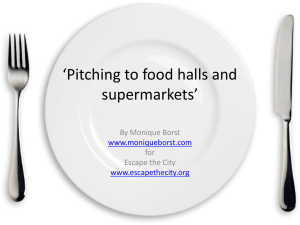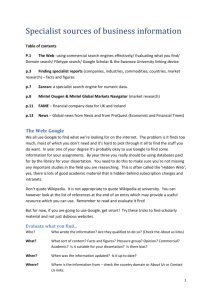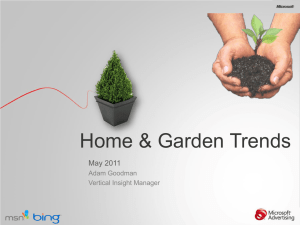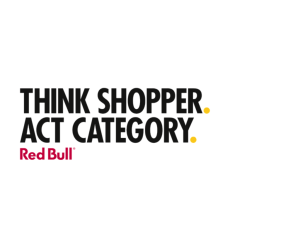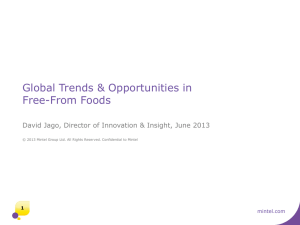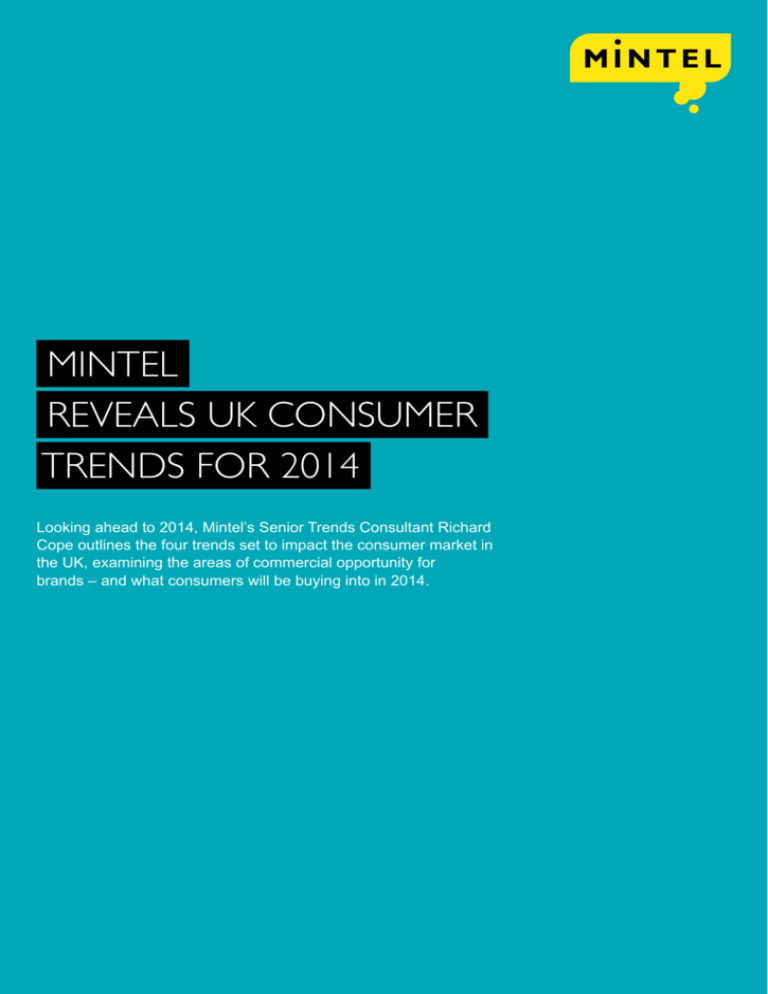
Mintel 2014 trends
Mintel
reveals UK consumer
trends for 2014
Looking ahead to 2014, Mintel’s Senior Trends Consultant Richard
Cope outlines the four trends set to impact the consumer market in
the UK, examining the areas of commercial opportunity for
brands – and what consumers will be buying into in 2014.
© 2013 Mintel Group Ltd. All Rights Reserved. Confidential to Mintel
mintel.com
Mintel 2014 trends
Mintel 2014 trends
Internationalism
on the Agenda
© 2013 Mintel Group Ltd. All Rights Reserved. Confidential to Mintel
mintel.com
Mintel 2014 trends
Internationalism on the Agenda
After a period of Brand Britannia fever, driven by Olympic
medals, Royal weddings and births, in 2014 it will be time
for British consumers to look outwards at other countries.
Next year’s sporting events, immigration legislation and
pending referendums will put other countries’ products on
the menu. Mintel’s research reveals that Brits are open,
curious and savvy when it comes to buying into new,
engaging or better value products from abroad.
Mintel’s Provenance in Food and Drink UK 2013 report
shows that, in spite of recent events, ‘patriotic purchasing’
remains something of a myth and British custom is there to
be won: 48% of consumers agree that ‘price matters more
than whether a product is British’ and 30% say ‘I do not feel
any loyalty to buying British food
and drink’.
Further Mintel research reveals that price comes before
patriotism and provenance with 58% of consumers saying
‘the price and the quality of what I buy is what matters, not
where it was produced’. Meanwhile, 54% of Brits say that
they’re ‘just as interested in buying authentic products
(e.g. French Brie, Parma ham) from other countries
as from Britain’.
48%
of UK consumers agree
that “price matters
more than whether a
product is British”
30%
58%
54%
of UK consumers say “I
do not feel any loyalty
to buying British Food
and Drink”
of UK consumers say
“It’s the price and the
quality of what I
buy is what matters,
not where it
was produced”
of UK consumers say
that they’re “just as
interested in buying
authentic products
from other countries
as from Britain”
© 2013 Mintel Group Ltd. All Rights Reserved. Confidential to Mintel
mintel.com
Mintel 2014 trends
Internationalism on the Agenda
Being British
is now as much
about embracing
different cultures
as it is about
sticking to
British traditions
© 2013 Mintel Group Ltd. All Rights Reserved. Confidential to Mintel
mintel.com
Mintel 2014 trends
Internationalism on the Agenda
In 2014, a number of factors will focus consumers’
attention on the provenance of products from inside
and outsidethe UK. The FIFA World Cup and Winter
Olympics will see British consumers fed a diet of
Brazilian and Russian products and campaigns, whilst
the Commonwealth Games will become an early rallying
point for the run-up to the Scottish independence
referendum. Whilst this means that the very concept of the
United Kingdom is up for review, Scottish products and
provenance will enjoy a heightened profile.
New legislation in 2014 will also raise the foreign influx and
influence in the UK, piquing our curiosity in other cultures
and causing us to re-examine notions of ‘Britishness’. The
Government is simplifying its visa processes for admitting
Chinese visitors to the EU and in January 2014, temporary
migration and employment restrictions on citizens of
Romania and Bulgaria will be lifted in the UK.
Mintel’s data would suggest that negative reporting in
certain sections of the media on the issues of immigration
is somewhat off-key and that the British are largely tolerant
and open to embracing new cultural influences. In our
survey on nationhood, 74% of consumers say ‘Tolerance of
others is an important part of British culture’ and 50% agree
with the statement that ‘Being British is now as much about
embracing different cultures as it is about sticking to British
traditions’, compared with 20% who disagree.
This is borne out by further data in our Seasonal Lifestyles
UK 2013 report – where an impressive 12% of the UK
population say that they celebrate Hanukkah, Ramadan
or Diwali – and our Menu Flavours UK 2012 report, where
8% of diners have visited a Polish restaurant and 42% are
interested in doing so.
74%
12%
50%
of UK consumers say
“Tolerance of others is
an important part of
British culture”
of UK consumers say
that they celebrate
Hanukkah, Ramadan
or Diwali
of UK consumer agree that
“Being British is now as
much about embracing
different cultures as it
is about sticking to
British traditions”
© 2013 Mintel Group Ltd. All Rights Reserved. Confidential to Mintel
mintel.com
Mintel 2014 trends
Mintel 2014 trends
Club Tropicalia
© 2013 Mintel Group Ltd. All Rights Reserved. Confidential to Mintel
mintel.com
Mintel 2014 trends
Club Tropicalia
The World Cup is going to make the world fall in love with
all things Brazilian. The country’s place in the cultural
and commercial spotlight has been a long time coming:
It has not hosted a World Cup since 1950 and it’s almost
as long since the Bossa Nova and Tropicalia movements
brought its music to a global audience in the 1960s. This
time around, the showcase of Brazilian commercial cultural
exports will encompass everything from food and fashion to
beauty products.
The Olympic handover ceremony at the close of London
2012 showcased the talents of singers Marisa Monte and
Seu Jorge, but probably confounded and engaged UK
viewers in the same tantalising fashion that the opening
ceremony did for the rest of the world. Whilst the Brazilian
Institute of Tourism is rather ambitiously predicting 600,000
foreign tourists spending, there is no doubt about the fact
that billions will be watching back home and this creates
enormous potential for British consumers to be exposed to
and buy into all manner of Brazilian products and services.
© 2013 Mintel Group Ltd. All Rights Reserved. Confidential to Mintel
mintel.com
Mintel 2014 trends
Club Tropicalia
Brazilian brands are alive to the opportunity, with trade
association Wines of Brazil aiming to double exports
between 2012 and 2016, whilst Moët et Chandon is
producing a Chandon Brazilian sparkling wine from the
Bento Gonçalves area of Southern Brazil. When it comes
to food and drink, UK consumers are open to new tastes
from around the world, as shown in Mintel’s Provenance in
Food and Drink UK 2013 report, where 50% of wine, 42%
of beer and 40% of spirit drinkers agree with the statement
‘I like to try drinks from different countries’.
Brazil is also host to a huge range of fruits and fruit-based
drinks and the Trade and Investment Promotion Agency
IBRAF is seeking to develop an industry that produces 43
million tonnes of tropical, subtropical and temperate climate
fruits, but currently exports just 31% of these.
50%
42%
of UK wine drinkers
like to try drinks from different countries
of UK beer drinkers
like to try drinks from
different countries
40%
60%
of UK spirit drinkers
like to try drinks from
different countries
of UK consumers have
not but would like to visit a
South American restaurant.
It’s early days on the product launches front, but
Mintel’s new product innovation database (GNPD) has
already logged the launch of an authentic Brazilian Pão
de Queijo – or cheese bread – mix in the UK and there
are a host of other foods that have the potential to take
off. At the forefront are Antarctica’s Guaraná soft drink
and Brazil’s national beer Brahma – which already enjoys
3.5 million likes on its official Brahma Seleção football
Facebook page.
There’s also potential for Acai berries – eaten frozen
with muesli as a breakfast in Brazil – as well as Brazilian
branded coconut water products. As an accompaniment to
watching football, Cachaça has enormous potential, with
Velho Barreiro and Sagatiba the brands to look out for,
whilst coxinha chicken pastries made with cassava flour
and pastel cheese-stuffed pastries might be positioned
as the perfect authentic accompanying match snack. The
caipirinha cocktail meanwhile now comes in many guises
with Cachaça substituted by vodka (a caipiroska) and
rum (a caipirissima).
Brazilians are also passionate about meat and churrasco
chain restaurants like Rodizio and Braza have the potential
to appeal to the 60% of consumers who have not but would
like to visit a South American restaurant in Mintel’s Ethnic
Restaurants and Takeaways UK 2013 report.
© 2013 Mintel Group Ltd. All Rights Reserved. Confidential to Mintel
mintel.com
Mintel 2014 trends
Club Tropicalia
We can expect to see
heightened interest
in typically Brazilian
weight loss and body
toning treatments,
such as body-shaping
massages and ‘butt-lifts’,
as well as samba
dancing and Capoeira
martial arts lessons
incorporating a mix of
dance and fight moves.
© 2013 Mintel Group Ltd. All Rights Reserved. Confidential to Mintel
mintel.com
Mintel 2014 trends
Club Tropicalia
the shoe of the summer, especially since Mintel’s
Footwear Retailing UK 2013 report shows that 51% of shoe
shoppers agree that well-known branded footwear is worth
paying more for. Beachwear brands like Água de Coco,
Salinas and Blue Man also have the potential to leverage
Brazil’s entrenched associations with Ipanema beach chic.
Beauty is perhaps the segment where Brazil is most
established in the consciousness of British consumers, but
there is potential for more products, services and brands
to cross over. Mintel’s Shampoo, Conditioners and Styling
Products UK 2013 report shows that 18% of haircare users
are interested and willing to pay more for products which
this in an area where Brazilian brands excel.
We’ve already seen the ‘Brazilian blow-dry’ established
as a haircare trend, as well as UK launches for La Coupe
Orgnx Embrace Balance Straighten range infused with
Brazilian Keratin Complexas as well as the Amazonia
Preciosa range. On the ‘beach chic’ front, the Sol de
and purity of a Brazilian beach experience’. In a country
where 12% of those interested in using self-tanning
products don’t use a high SPF because they want a tan
and 39% use or would use self-tanning products to give
them a holiday glow, Brazilian products have the potential
to capture the summer market. Amazon plant products and
global brands like Kiehl’s, Aveda and MAC Mineralize are
already using Acai berries, pigment from Urukum seeds
and dust from semi-precious stones in their products.
heightened interest in typically Brazilian weight loss and
body toning treatments, such as body-shaping massages
and ‘butt-lifts’, as well as samba dancing and Capoeira
martial arts lessons incorporating a mix of dance and
We mustn’t ignore the fact that Brazil’s time in the spotlight
comes at a cost and this presents a challenging time for
sports sponsors. Film director Walter Salles hits the nail
on the head in his observation that ‘In the last year, Brazil
spent twice as much on refurbishing and constructing
stadiums for the World Cup as on basic sanitation’.
Brands in Brazil must seek to avoid being seen to be
sponsors of the white elephants that have diverted
attention and funds away from the issues that matter to
citizens – and consumers – in Brazil. They need to avoid
provoking consumer boycotts and offer bold solutions
seen Havaianas create the Alpargatas Institute helping
over 250,000 students ‘gain knowledge, experience, and
initiative that ‘helps 6-17-year-olds improve their academic
performance and gain access to better employment
opportunities through sports, education, art and culture,
de Janeiro’.
51%
of UK shoe shoppers agree
that well-known branded
footwear is worth
paying more for
39%
of UK consumers
interested in using self
tanning would use them to
a holiday glow
mintel.com
Mintel 2014 trends
Mintel 2014 trends
a PRIVATE FUNCTION
© 2013 Mintel Group Ltd. All Rights Reserved. Confidential to Mintel
mintel.com
Mintel 2014 trends
A Private Function
With the launch of Google Glass and the fallout from
the NSA scandal, surveillance and data monitoring will
continue to be big news in 2014. We’re going to see
consumers looking for greater privacy – but also greater
functionality – from their data as they bid to take further
control of it to help them to streamline their lives and better
analyse themselves. All of this is raising discussion around
data privacy, but also its value and usability.
In the political arena we’re already seeing something of
a reaction against supposedly vulnerable data platforms.
According to the Cloud Security Alliance, 56% of nonUS respondents are now hesitant to work with any USbased cloud service providers, whilst 10% of 207 officials
surveyed at non-US companies have cancelled contracts
with US service providers. This has hastened the European
Commission’s plans for a secure ‘EU cloud’ offering the
region competitive advantages.
In the consumer space, there is potential for wider
adoption of encryption software and we’ve already seen
researchers at Carnegie Mellon University release a
smartphone app called SafeSlinger they say encrypts text
messages so they cannot be read by cell carriers, internet
providers, employers ‘or anyone else’. However, it’s the
rise of wearable technology – with Google Glass being the
most conspicuous contender – that’s going to focus and
productise the debate around how much we can scrutinise
ourselves and each other.
23%
59%
19%
17%
36%
of UK consumers
say they find video
adverts that target
you according to your
internet activity
off-putting
of UK consumers
agree that online
advertising that
is based on their
browsing history
makes them feel
uncomfortable
of UK consumers
are concerned
about how
aggregators use
personal data
of UK consumers say
they like the idea of
information on their
receipt informing
them how healthy
their shopping
basket is
of UK online grocery
shoppers say they
would be interested
in a nutritional review
of basket contents
© 2013 Mintel Group Ltd. All Rights Reserved. Confidential to Mintel
mintel.com
Mintel 2014 trends
A Private Function
One reason
that wearable
technology may
be warmly
welcomed is
its ability to
track the location
of loved ones
© 2013 Mintel Group Ltd. All Rights Reserved. Confidential to Mintel
mintel.com
Mintel 2014 trends
A Private Function
In 2014 we can expect the commercial launch of a device
alongside Google Glass App Store, but the imminent
launch of a Google Smartwatch might be earlier – and
bigger – news. One reason that wearable technology may
be warmly welcomed is its ability to track the location of
loved ones – something increasingly important in an era of
working ‘Alpha Mothers’ and multigenerational homes that
care for elderly relatives. We’ve already seen the launch of
the FiLIP – a wrist device for children that acts as both a
smartphone and a locator for worried parents – and similar
technology can take off for all ages.
After acquiring Nokia, Microsoft is also reportedly testing
its own prototypes and our analysts at Mintel believe that
it’s smartwatches that will ultimately have the most impact.
Some manufacturers like Samsung are embracing the
issue of privacy head-on; its Galaxy Gear smartwatch emits
a loud snapshot sound when taking photos for instance.
Retailers and advertisers may also start to become
embroiled in the debate, now that in the US Google has
patented ‘pay-per-gaze’ eye-tracking technology, allowing
the company to measure the media people look at, the
length of time they view, their reaction and their emotional
response, via pupil dilation.
Mintel’s research shows that intrusion and privacy are
indeed issues for brands to heed: our Media Consumption
Habits UK 2013 report shows that 23% of consumers say
they ‘find video adverts that target you according to your
internet activity off-putting’, whilst 59% of consumers agree
that online advertising that is based on their browsing
history makes them feel uncomfortable in our
Digital Trends UK 2013 report and 19% are concerned
about how aggregators use personal data in our Web
Aggregators in Financial Services UK 2013 report.
© 2013 Mintel Group Ltd. All Rights Reserved. Confidential to Mintel
Yet consumers are embracing self-analysis, with
9% of health-conscious consumers having used online
health trackers to help them stay on track in our Healthy
Lifestyles UK 2013 report. Beyond the cutting-edge areas
of wearable tech, the greatest opportunity for self-analysis
could lie in the humble loyalty card – something that 66% of
UK consumers use, according to our data from The Savvy
Shopper UK 2012 report.
The next stage is for grocery brands to offer positive data
surveillance for customers – in the form of opt-in nutritional
analysis services. Mintel’s research shows that the will is
there amongst consumers: 17% of consumers say they
like the idea of information on their receipt informing them
how healthy their shopping basket is in our Food and
Drink Retailing UK 2013 report, whilst 36% of UK grocery
shoppers say they would be interested in a nutritional
review of basket content in our Online Grocery Retailing
UK 2012 report.
9%
of health-conscious
consumers have used
online health trackers to
help them stay on track.
mintel.com
Mintel 2014 trends
Mintel 2014 trends
hEALTHY FUELS
© 2013 Mintel Group Ltd. All Rights Reserved. Confidential to Mintel
mintel.com
Mintel 2014 trends
Healthy Fuels
In late 2014 new labelling legislation – The Food
Information Regulation (EU) 1169/2011 – will extend
beyond the current situation, where drinks containing
more than 150mg of caffeine per litre (mg/l) are deemed to
have ‘high caffeine content’, to ‘require additional caffeine
labelling for high-caffeine drinks and foods where caffeine
is added for a physiological effect’. This is going to place
pressure on energy drinks brands and in the run-up to this
legislation we’re going to see a new wave of competition
from natural and vegetable drinks launches.
At Mintel we’ve already seen a host of new launches
in late 2013, including an Apple, Cucumber & Kale
Juice that delivers a ‘rehydrating nutritious boost’ from
Aartizen Wellness Within; a Celery, Apple & Kale Juice
with ‘a natural source of Vitamins A and C, potassium,
phosphorus, iron, magnesium and calcium free from added
sugar, additives, preservatives, concentrates, gluten and
dairy’ from Vegesentials; a Broccoli, Pear, Spinach, Kale,
Kiwi, Lemon & Banana Nutritious Raw Smoothie containing
two of 5-a-day portions of fruit and vegetables and no
sugar from SaVse; a Spirulina, Apple & Mint Smoothie
‘that brings the benefits of minerals and vitamins on the go’
from Nosh and – in Argentina – a Coca-Cola low-calorie
carbonated drink ‘naturally sweetened with Truvia’.
Indeed, in the UK alone new product launches of drinks
with a ‘no additives or preservatives’ claim grew 56% over
the past five years to 2012. Meanwhile, new UK drinks
product launches with a ‘low/no/reduced sugar’ claim
increased 63% over the same period.
In the UK new product
launches of drinks with a no
additives or preservatives
claim, over the past
five years to 2012 grew
56%
41%
of UK consumers say that
“It’s worth paying more
for added benefits”
72%
of UK consumers say that
“there should be healthier
(eg sugar/calorie free)
varieties of energy drinks”
34%
of UK energy drinks users
claim they “worry about
becoming reliant on them for
an energy boost”
© 2013 Mintel Group Ltd. All Rights Reserved. Confidential to Mintel
mintel.com
Mintel 2014 trends
Healthy Fuels
New labelling
legislation is
going to place
pressure on energy
drinks brands and
in the run-up to this
legislation we are
going to see a new
wave of competition
from natural
and vegetable
drink launches.
© 2013 Mintel Group Ltd. All Rights Reserved. Confidential to Mintel
mintel.com
Mintel 2014 trends
Healthy Fuels
According to Mintel’s data, UK consumers would appear
very open to the prospect of new ‘healthy’ launches
within the energy drinks sector. In Mintel’s Fruit Juice,
Juice Drinks and Smoothies UK 2013 report, 38% of UK
consumers agree that ‘fruit and vegetable juice blends are
healthier for you than pure fruit juice’.
In 2014 we’re going to see a lot of launch activity from
brands in a bid to react early to this pending legislation.
The big opportunity here is that both non-users and users
of the current energy drinks brands appear ready to try a
new alternative: Mintel’s research shows 34% of energy
drinks users claim they ‘worry about becoming reliant on
them for an energy boost’, whilst 37% of non-users cited
the fact that ‘they contain too many artificial ingredients or
colourants’. In contrast, there appears to be a bright future
for energy drinks with a natural, functional dimension, with
72% of consumers saying that ‘there should be healthier
(e.g. sugar/calorie-free) varieties’, 71% that ‘there should
be more drinks with natural colourings/flavourings’ and
41% that ‘It’s worth paying more for added benefits
(e.g. added vitamins)’.
38%
of UK consumers agree that
“fruit and vegetable juice
blends are healthier for you
than pure fruit juice”
© 2013 Mintel Group Ltd. All Rights Reserved. Confidential to Mintel
mintel.com
Mintel 2014 trends
For more information
go to mintel.com
or call +44 (0)20 7778 7151
© 2013 Mintel Group Ltd. All Rights Reserved. Confidential to Mintel
mintel.com

